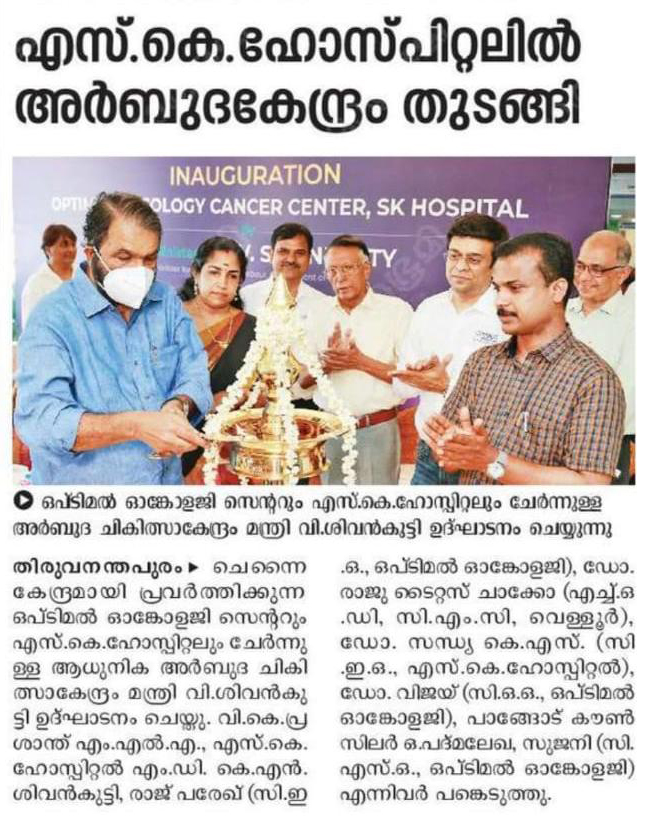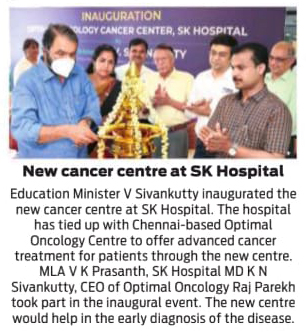Kerala Koumathi - 16 April, 2022

With the growing number of cases in cancer it is nearly impossible for the patient to get an appointment with a particular specialist. Unfortunately, the oncologists in different specialities are also not in a position to travel. This is where we bring the Hybrid Consultation Platform where we have on board specialists from different fields who will virtually come on videoconferencing call to meet and consult with the patients.
Cancer cells usually grow faster than normal cells. Chemotherapy is the method of treatment where drugs are used to destroy these cancer cells chemotherapy usually works by restricting them from growing, dividing and making more cells. This treatment has more effect on cancer cells. Chemotherapy is considered an essential treatment because the drugs travels throughout the body, and can kill cancer cells that have spread to different parts of the body far away from the original tumour. The main aim of this is to control the spread of the disease. Chemotherapy can be administered through Intravenous (IV) or can be given orally also.
Cancer cells grow and divide faster than normal cells. Radiation therapy is the method of treatment where they use high energy particles or waves like x-rays, gamma rays, electron beams or protons to destroy or damage cancer cells. Radiation makes small breaks in the DNA inside cells. These breaks keep cancer cells from growing and dividing and cause them to die. Radiation therapy is usually a local treatment which means it is aimed at and affects only the part of the body needing treatment. Some radiation treatments use radioactive substances that are given in a vein or by mouth. The treatment regimen usually consists of a specific number of treatments given over a set period.
Surgery is a treatment or procedure where the tumour and the nearby tissue is removed by operation. This is one of the oldest kinds and offers greater chance at treating many types of cancer. Surgery is used for preventing, diagnosing, finding out the stage, and treating cancer. In some cases, one surgery can take care of more than one of these goals and in in some others more than one operation may be needed over time. In few cases, the only way to know if a person has cancer and what kind it is, is by taking out a small piece of tissue and testing it. The diagnosis made by doing some lab tests or looking at the cells from the tissue with a microscope.
Today we can screen and predict risk for inherited cancers, diagnose treat many types of cancers and predict drug response for various drugs by testing your blood sample or the cancer tissue using genome sequencing technology which analyses the changes in your genetic code, the DNA.
Immunotherapy is the type of treatment that uses body’s own immune system to fight cancer. Immune system consists of a complex process body uses to fight illness. This process involves your cells, organs, and proteins. Cancer can get around many of the immune system’s natural defences, allowing cancer cells to continue to grow. Immunotherapy can be done by stimulating or boosting the natural defences of the immune system so it works harder or smarter to find and attack cancer cells or by using substances made in a lab that are just like immune system components and using them to help restore or improve the immune system.
Targeted therapy is a type of cancer treatment that uses drugs or other substances to identify and target cancer cells without affecting normal cells. This therapy can be treated by itself or in combination with other treatments like chemotherapy, surgery, or radiation therapy. If the cancer has the target that a treatment is designed for then this type of treatment is suggested.
Hormonal Therapy is a type of cancer treatment that removes, blocks, or adds specific hormones to the body. Hormones are substances made by the body that help to control how certain types of cells work. Some cancers depend on hormones to grow. Because of this, treatments that block or alter hormones can sometimes help slow or stop the growth of these cancers. This type of treatment is also known as Hormone Therapy or Endocrine Therapy.
Our network of specialist providers specialise in pain medicine for providing the highest quality of care and they will able to offer more unique solutions to pain management.
Palliative care is the special approach for anyone with serious illness such as cancer. This type of care focuses on improving the condition of life by helping you and caretakers manage the symptoms and side effects of treatment. Palliative care is an important part of care that is included along with treatments. Often care is offered as soon as the cancer is diagnosed, while treatment and continued even after treatment is completed.
Screening is an integral part of prevention. As per the World Health Organization (WHO) guidelines, screening is mandatory for the most common cancers in India, breast, cervical, and oral cancers. Our multi-disciplinary team of experts will conduct certain tests before signs or symptoms (asymptomatic) appear in order to identify the at-risk individuals and work with closely with each individual to prevent the disease occurrence. In symptomatic individuals, these tests will be able to detect the cancer at its early stages which can increase the survivability and maintain the quality of life.
Once you are diagnosed with cancer or you are undergoing treatments, you and your families will undergo a variety of physical and psychosocial problems, ranging from physical pain, fatigue, anxiety, depression, strain on personal relationships which has a deep impact on quality of your life. Our team of Psycho-oncologists will be available to answer all your questions related to diagnosis, treatments and management of your condition.
Genetic counselling is the process in which we help you and your family investigate and understand about the risk of inherited disorders in cancer. When one or more of your relatives have been diagnosed with cancer, for example Breast cancer it is best to talk to a Genetic counsellor to understand your risks and the type of screening tests that are suitable for you.
On the other hand, a patient will also benefit from Genetic counselling to understand the suitable diagnostic tests for identifying targeted therapy treatments and also tests that are available to predict response to certain drugs.
Crowd funding are online campaigns that raise money from a large number of people to help you and your family cover a part or full expenses with regards to treatment. Cancer treatments are long, the treatment and few drugs are expensive. Crowd funding platform helps raise money in the most effective way.
Blood cancers affect blood, bone marrow and lymph nodes. Cancerous cells prevent your blood from carrying out its normal functions like fighting off infections or preventing serious bleeding.There are three types of blood cancer Leukemia, Myeloma and Lymphoma.
Bone cancer is a rare type of cancer that can affect any bone in the body. However, it’s unusual for it to begin in your bones. It’s much more likely to have spread to your bones (metastasised) from cancer in another part in your body. The three most common primary bone cancers are; osteosarcoma, chondrosarcoma, and Ewing’s sarcoma. Other rare types include cell sarcomas (very similar to osteosarcomas, behave similarly and doctors treat them similarly), fibrosarcomas (rare, in middle-aged adults, thigh bone most commonly) and leiomyosarcomas (very rare type of spindle cell sarcoma).
Brain tumours are lumps of abnormal cells that have formed in the brain. If a tumour starts in the brain, it’s a primary tumour. umours starting in cranial nerves can cause vision problems,Trouble swallowing, Hearing loss in one or both ears,Facial paralysis, numbness, or pain. Spinal cord tumours start in the neck and can cause symptoms in the arms and legs, as well as affecting bowel and bladder function
Breast cancer is the malignant tumor that starts in the cells of the breast. It occurs both in men and women. It is the most common cancer in Indian women. However male breast cancer is rare.In 2018, 1.6lakh new cases and 0.8lakh deaths were reported for breast cancer in India
GI cancer, is a term for the group of cancers that affect the digestive system . The types include gastric cancer (GC), colorectal cancer (CRC), oesophageal cancer, hepatocellular carcinoma (HCC), esophageal cancer (EC), gall bladder cancer, bowel, small intestine, anal cancer, and pancreatic cancer (PC). Overall, the GI cancers are responsible for more cancers and more deaths from cancer than any other organ.
Genitourinary cancer can affect the Kidneys,Bladder Ureters (tubes that connect other organs in this area) Urethra (tube that drains urine from the bladder to the outside) Male genitalia and Prostate.Kidney cancer is one of the most common cancers. It’s rare before the age of 50, and the risk increases with age.
Gynaecological cancers affect a woman’s reproductive system. In most cases, the type of gynaecological cancer is named after the part of the body where the cancer first develops namely Ovarian Cancer,Endometrial Cancer, Cervical Cancer, Vaginal Cancer, Cancer of the Vulva and other types of gynaecological cancers that include fallopian tube cancer and placenta cancer (a pregnancy-related cancer).
Head and neck cancers account for more than 5.5 lakh of the total cancer cases reported in India every year, putting India in the sixth place worldwide. 80 per cent of the cancer is attributed to tobacco consumption, while 75 per cent is due to alcohol.Cancers in the mouth, throat, salivary glands, nose and sinuses are collectively termed head and neck cancers.
Lung cancer originates from the tissues of the lung, usually from cells lining the air passages. The two main types are small cell lung cancer (SCLC) and non-small cell lung cancer (NSCLC). It is the second most common cancer in men and the fifth most common cancer in both men and women together.
The risk of getting lung cancer for smoker to non-smoker is 20:1 as per various studies.
Tumors that form in the mediastinum are also known as primary tumors. The central portion of the chest cavity located behind the sternum (breast bone) and between the lungs and extending from the neck above to the diaphragm below is known as the mediastinum. The mediastinum contains the heart, thoracic aorta, trachea (airway), esophagus (swallowing passage), thymus gland, and lymph nodes.Sometimes mediastinal tumors will develop because cancer from another part of the body has spread and are known as a secondary tumor.
Children's cancers,otherwise referred to cancers occuring in children are known as Pediatric cancers.They are not always treated like adult cancers.The most common types of cancer diagnosed in children ages 0 to 14 years are leukemias, brain and other central nervous system (CNS) tumors, and lymphomas.
Skin cancer happens when skin cells change into abnormal cells and grow at an uncontrolled rate.There are two main types of skin cancer: melanoma and non-melanoma skin cancer and the number of cases for both is increasing worldwide.



